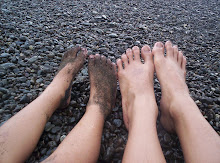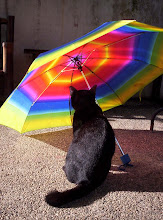I have a Siamese cat named Chloe. I have a two-year-old daughter with the same name.
The cat goes ecstatic at the sight of a fly trapped in the window screen. The kid sneaks up on the sleeping cat and prods her behind with a long-handled spoon, and laughs wildly when the cat jumps up in terror. Both of them love soft bread. Both of them have evil tempers.
When we call out “Chloe!” both cat and child look around to see which one is guilty. To solve the problem, we added a description at the end of the name. Now we have “Chloe the Cat” and “Chloe the Kid.”
But it’s such a mouthful, so we tried calling one just “Cat” and the other “Kid.”
They wouldn’t respond. Maybe it felt like we grown-ups weren’t according them the proper dignity befitting the name, which is one of the many names of the Greek goddess Demeter.
My elder daughter suggested that we change the name of her little sister, so that the cat can lay claim to the name. The nanny argued that it didn’t seem proper for a child to give way to a mere cat. The cat sniffed and looked insulted.
Finally we came to a solution. We’re sticking with Chloe, and we just wait to see which one jumps. We’re also checking closely which one nibbles on the cat biscuits.
Monday, September 27, 2010
unfinished houses

When I was growing up, we did not live in our own house. We lived in my grandparents' house, a grand affair in marble with three bedrooms, terraces front and back, heavy narra furniture, and huge cabinets filled with expensive china.
So where was our house? It was in an isolated little village where my parents' teaching posts were. In those days, you went to wherever the school superintendent sent you. They sent public school teachers to godforsaken places to spread education. We went there only during the summer, because my grandmother thought we were too good to live in a place with no electricity and the only source of entertainment at night was watching fireflies converge on trees.
For the child that I was, I thought our house in the little barrio was the grandest, but in all the summers I spent there, it was always a work in progress. In a place where most houses had walls of wood and roofs of thatched coconut fronds, ours had a stone foundation and concrete walls. It was also elevated, because it had a basement. The basement, my parents said, was going to be a family room. There would be a little library in it. Imagine!
My father had a fishpond in the front yard, but we all begged him to turn it into a swimming pool. There were fruit trees around the fish pond, and we had a tree house. Well, the river was just across the road, but how many kids could sit in their own tree house while fishing?
My mother loved plants and had an enviable collection of orchids. She also grew vegetables in over a dozen plots in the backyard. My father loved animals; he kept pets that weren't exactly ordinary. He had a couple of dozen geese, a family of turkey, and assorted birds. He had pigs in a pen, fighting cocks, and lots and lots of hens that chased children. At any given time he had three fierce hunting dogs, and when he told his friends that his dogs were trained to kill, we children looked at the drooling sonsabitches with respect. At one time he also kept a deer, a hornbill, and a hawk. He hunted; it was his dream to kill a wild boar single-handedly.
And we spent those summers in the not-quite-a-house, with rough timber all around and steel bars in the backyard, piles of hollow blocks and pails of nails. It was fun, like being at camp, like pretending you were Indians and you lived in the wilderness.
My parents saved a little, built a little. One summer we didn't have stairs; the next we had balusters. Maybe my parents looked at tile samples together, or talked to carpenters together to know if the basement walls could withstand seeping water.
But somewhere along the line something went wrong, and they stopped building. Perhaps they stopped loving. Who knows? Then they started to accept teaching assignments in other places, and they left the house. It was the start of their marriage's decline, although we kids were blissfully unaware of it.
My parents separated when I was twenty. My father died when I was thirty-two. The house stood there over years, slowly rotting. The steel bars in the basement rusted, and it was said that there lived large snakes. The bedrooms became the territory of a colony of bees. The large hardwood panels were brought to various neighbors' houses for safekeeping. Until when, they did not know. Maybe they're still there, or already a part of the furniture.
I don't like looking at unfinished houses. They look so much like unfinished stories. You see the beginnings of something good and wonderful, and you know that someone took the time and effort to start building it. It was planned, and there was love in it.
It was sad to look at that unfinished house. You see the beginning of a dream, but you will never know why the dream turned sour. You will never know the many stories that will be told inside the house, the meals to be shared, the laughter in the morning, the comic books on hot afternoons. You will never know if it will have walls in a shade called robin's egg blue, or if the library will have warm yellow light from wall lamps. You will never know if the orchids in the garden will be the envy of everyone, or if the father will run out of exotic pets to keep. You will never know if there will be visiting grandchildren in the summer, and how many of them will fight over the privilege of sitting in grandfather's knee. You will never know all that could be, in that house.
Unfinished house, unfinished love. It's all the same. Left untended and neglected, all it will be is an empty, sad ruin.
Friday, September 24, 2010
talent
I'm currently reading Stephen King's 'The Dark Tower VII' for the third or fourth time. It's 1,050 pages long, and a third of the way through, on page 349 to be exact, there's a statement that I love. Ted Brautigan was explaining how he was using telepathy.
"Because talent won't be quiet, doesn't know how to be quiet," he said. "Whether it's a talent for safe-cracking, thought-reading, or dividing ten-digit numbers in your head, it screams to be used. It never shuts up. It'll wake you up in the middle of your tiredest night, screaming, 'Use me, use me, use me! I'm tired of just sitting here! Use me, f**khead, use me!'"
The only thing talent wants is to be used. Check out the auditions on Pilipinas Got Talent, Pinoy Records, and all the various talent contests on TV. People from all walks of life, trying their luck. No, let's be honest: showing off. And some of them impress you so much it makes you want to stand up and cheer, for talent cannot be denied.
Ask the real artists, the masters of their craft. The ones who can reach glass-shattering notes when they sing, the ones whose paintings go for million-dollar auctions, the ones who twirl and dance like they have no bones. Ask the authors whose books are on the New York Times Bestseller List. They'll say that at the bottom of their hearts, they don't do it for money. They do it because they can; they do it for love. (Of course you get a kick out of being paid, but it's just icing on the cake.)
All of us have talent, be it deep-sea diving, putting babies to sleep, cooking a mean pasta puttanesca, or, as Ted Brautigan says it, dividing ten-digit numbers in your head. It gives us a nice kind of high when it is used, and used well. What is it that I want to do, the one thing I know I can do well, the one thing that makes me happy and at peace with myself? I want to write. So I think I will keep writing—in diaries, blogs, scraps of paper—as long as I can.
And what happens if I can't write anymore? Then something in me will die.
Let's take the lyrics from The Guitar Man by Bread:
Then the lights begin to flicker and the sound is getting dim
The voice begins to falter and the crowds are getting thin
But he never seems to notice, he's just got to find another place to play
Fade away, got to play.
That's what talent is.
"Because talent won't be quiet, doesn't know how to be quiet," he said. "Whether it's a talent for safe-cracking, thought-reading, or dividing ten-digit numbers in your head, it screams to be used. It never shuts up. It'll wake you up in the middle of your tiredest night, screaming, 'Use me, use me, use me! I'm tired of just sitting here! Use me, f**khead, use me!'"
The only thing talent wants is to be used. Check out the auditions on Pilipinas Got Talent, Pinoy Records, and all the various talent contests on TV. People from all walks of life, trying their luck. No, let's be honest: showing off. And some of them impress you so much it makes you want to stand up and cheer, for talent cannot be denied.
Ask the real artists, the masters of their craft. The ones who can reach glass-shattering notes when they sing, the ones whose paintings go for million-dollar auctions, the ones who twirl and dance like they have no bones. Ask the authors whose books are on the New York Times Bestseller List. They'll say that at the bottom of their hearts, they don't do it for money. They do it because they can; they do it for love. (Of course you get a kick out of being paid, but it's just icing on the cake.)
All of us have talent, be it deep-sea diving, putting babies to sleep, cooking a mean pasta puttanesca, or, as Ted Brautigan says it, dividing ten-digit numbers in your head. It gives us a nice kind of high when it is used, and used well. What is it that I want to do, the one thing I know I can do well, the one thing that makes me happy and at peace with myself? I want to write. So I think I will keep writing—in diaries, blogs, scraps of paper—as long as I can.
And what happens if I can't write anymore? Then something in me will die.
Let's take the lyrics from The Guitar Man by Bread:
Then the lights begin to flicker and the sound is getting dim
The voice begins to falter and the crowds are getting thin
But he never seems to notice, he's just got to find another place to play
Fade away, got to play.
That's what talent is.
thursday morning
 I was standing by the side of the road, waiting for the van that will take me to the office. This was inside a Camella Subdivision, where the houses are mostly large and there are cars parked in front.
I was standing by the side of the road, waiting for the van that will take me to the office. This was inside a Camella Subdivision, where the houses are mostly large and there are cars parked in front.I was idly counting tricycles when I noticed a small woman walking towards me, with three little girls in tow. I thought the woman was old; when they got closer I saw that she was much younger than me, but she was a bit haggard. The three little girls seemed 2, 3, and 4 years old. They were all freshly bathed and had clean clothes, but mother and children did not look like they lived in a house with a car out front.
The three little girls all looked like they did not want to walk. The smallest was actually stamping her foot, and the other two were frowning mightily. As they passed me, the mother cheerily said that if the girls wanted bread for breakfast, they'd better walk. She saw me looking, and she flashed me a little conspiratorial smile. Her smile said, "You know how kids are." I gave her a little "I know" smile back. I saw her eyes take in my going-to-the-office clothes, nice shoes, and pretty bag, then they passed on.
I looked at their backs. Given another set of circumstances, the three little girls would have had fun growing up together. I imagine they'd go to school together, borrow each other's bracelets, and be close pals, giggling over the same handsome movie stars and having the same kind of music in their iPods.
But in reality, if my guess was right about how they lived, there's probably very little chance that all three would finish high school. In reality, there may be days when they're still hungry and there's no more rice in the pot. Maybe the mother stays home to take care of the little girls, while the father drives a jeepney or a tricycle, never earning enough to allow his daughters to dream of iPods.
It is a source of wonder to me how the marginally poor can live in railroad shanties, with a dozen children they can barely feed, and grin and say "God will provide." Three little girls are not too many, but to a couple with a sole breadwinner, three may be too much. I have two children seven years apart, my husband and I both have jobs, and sometimes I still worry about my two-year-old's university tuition 12 years from now.
But at seven in the morning, with a fresh day ahead, it is difficult to contemplate the issue of poverty and overpopulation and children who may want, but cannot, go to school. It is hard to imagine the reasons that would make a woman choose to marry young, bear children every year, and raise her children to grow up like her.
And maybe I was wrong about them. Maybe the woman had an SUV in the garage, and maybe her youngest kid would one day be First Lady of the Philippines. But the encounter provoked a thought, and is now worth a blog.
The woman and her three little girls were now further up the street. The smallest girl was now skipping, perhaps at the prospect of her breakfast. From a distance, they look beautiful in the sun.
Monday, September 6, 2010
under the dome

I waited half a year for this book. Powerbooks had this on hardcover last January, and I waited for someone to give this to me as a birthday gift... then Valentine... then anniversary. No luck. I figured I had to buy it for myself. Then it went out of stock.
Last week, I saw this in National Bookstore. Paperback. It was the display copy, and the salesladies weren't sure when the next delivery would be. I happily grabbed it, missed my lunch devouring the first few pages, and finished the whole book over the weekend.
It reminded me of The Simpsons Movie, where their whole town was enclosed by a dome (engineered by the government) because it was so badly polluted it was toxic. Then the government decided to blow the whole town out of existence, and of course Bart and Homer Simpson eventually saved the day.
Under The Dome was no kids' story. The dome came down inexplicably, and of course the town of Chester's Mill underwent some drastic changes. Our heroes, an ex-soldier, three computer whiz kids, a lady reporter, and a few others, sought to discover what made the dome (and how to get rid of it, if possible) while battling an evil town selectman.
It is a horror story, but not of the kind that has zombies, vampires, and things that go bump in the night (and perhaps eat you). In the situation of Chester's Mill, the horror came from what happened to ordinary people inside the dome. Alongside those who became heroes, there were people who killed themselves, who killed others, who went crazy.
There was Junior Rennie. He killed two women, hid them in a pantry, and helped hide two more bodies there. But he met two lost children while on patrol, and he was very gentle with them. He made sure they were alright and that there was someone to take care of them. In the end, as he was losing himself, he remembered the children and wanted to keep them safe.
And that's the real horror, isn't it? That we never know how black a man's heart is-- even our own-- until he comes face to face with it. I think there is a blackness in every heart, a germ, a seed. Most of us keep it tucked away, and it lies there sleeping. But in some, it takes root. If you water it a little, why, it flourishes. And it blossoms hate. Sometimes it bears black fruit, perhaps called murder. When it is very ripe, it bursts open and spreads its poison. The blackness clouds the brain, and by the time it clears again, we would have done something regrettable.
A wise man, once he recognizes that the seed has become very comfortable in his heart, would perhaps keep it pruned, to trim away the poison. And he learns to live with it. It is there, like a dark twin of all the kind intentions, all the goodness a man is capable of being, but he is master of both.
It's what makes the story a good story. You recognize the emotions there, it reminds us how fragile life really is, it shows us how powerful the mind is. It gives you a glimpse of black hearts.
It forces us to say hello to the monsters inside us.
Subscribe to:
Posts (Atom)



















